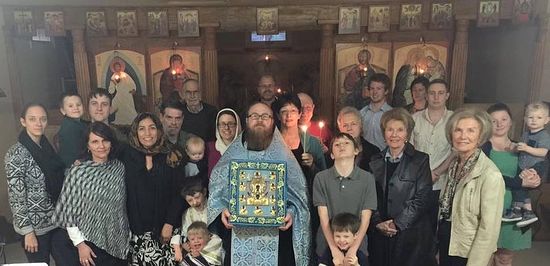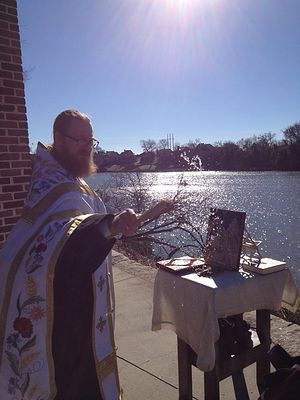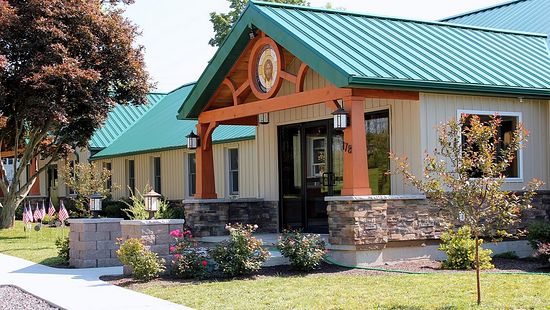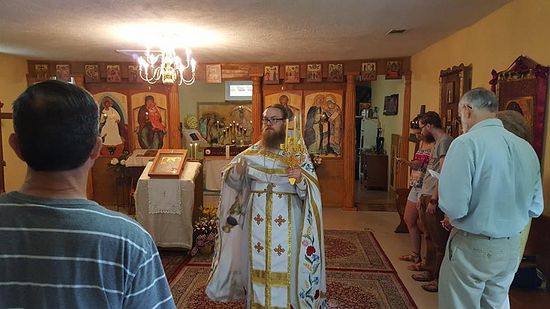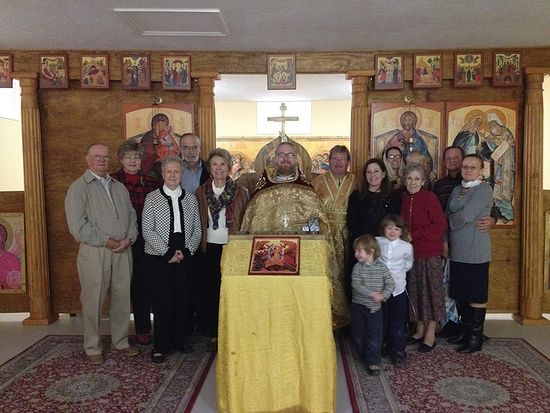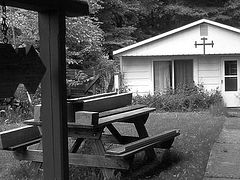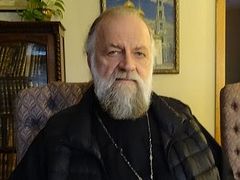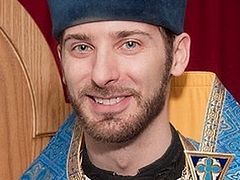Fr. Alexis Baldwin converted to the Holy Orthodox Church in 2009. A graduate of St Tikhon’s Orthodox Theological Seminary in 2013, he was ordained to the holy priesthood on July 14 of that year on the feast of All Saints of Britain and Ireland. He is currently the priest in charge at Holy Resurrection Mission in North Augusta, SC.
I had the joy of studying with Fr. Alexis in seminary and getting to know him and his wife Matushka Veronica and their children. Fr. Alexis was always approachable, in a good mood, passionate about the Orthodox faith, and hard-working, even pulling double duty as the seminary cook while simultaneously taking classes.
I had the great pleasure of catching up with Fr. Alexis recently in Kiev where he was on pilgrimage, and especially of attending services together at the Kiev Caves Lavra. While there we also found some time to chat about his life, work, struggles, and joys as a young priest serving in a small mission parish in the American south.
—Fr. Alexis, please tell us about your work as the priest of a small mission parish.
—Of course being a mission priest is a challenge because the mission priest usually has a double task, meaning they have to work and work at the mission at the same time, and I think that’s the biggest challenge. Anytime you work it divides up your time, and that’s not good. As Fr. Atty1 used to say, a priest has to give 100% to his family and 100% to the Church.
—How do you work that out?
—You don’t. It doesn’t have to make any sense. There are a lot of things in the spiritual life like that, and I think we began to encounter them even in seminary. Things don’t necessarily have to make sense on paper, but by the grace of God they work out and they make sense. If you put the work in and you’re under the guidance of your bishop and working with priests in your diocese then God provides the fruit. But it’s a lot of work and it’s a challenge.
That was a big concern. We didn’t move out to South Carolina to work my secular job, which is roasting coffee. It pays the bills and I’m happy that God has allowed me to be in a place where I can have a job that not only am I good at but I enjoy, but from the very beginning there was an understanding with the secular job that the reason I’m in South Carolina is to be a priest and serve the Church, and there can never be a conflict in those schedules.
—It’s good that you found a place that is understanding about that.
—Thank God, they’re very understanding. From the very beginning I was very open with my boss and manager about who I am, what I do, and what’s important. I like working there, but they understand that my priority lies with the Church. They may not understand the Church but they understand where the priority lies. That’s part of the struggle, but of course, I have to tell you, Fr. Atty used to say that every priest is a mission priest, and because of that I think mission priests share in the joy of the priesthood, period. It’s all joy. Even the struggle is a joy. It may not feel like it sometimes, but it’s all a joy.
Fr. Athanasy2 once said there’s nothing in the world even close to standing in front of the altar.
—I remember that.
—Fr. Athanasy was very memorable. So there’s nothing comparable—it’s all joy. Even the hardest struggles are all worth it because you have the joy of serving the Church as a priest in that sacred vocation. No matter what hurdles come up, whether they’re financial, or structural, or something in the community, if you’re faithful God will not only increase the blessings of your faithfulness, but He provides.
—Could you give us some examples in which you’ve seen this?
—When we first got there one of the biggest challenges that we had was to move the mission chapel from inside the parsonage house to another separate building. In order to do that we had to completely renovate it. It’s fantastic that the community had saved money before I even got there, so that aspect was particularly easy, but there is a tendency in mission work that to think that when you set a goal and you complete it then everything is going well. But those baby steps are still only baby steps.
For us, something that we never thought was possible was to have a brand new roof on the chapel.
—I remember your Go Fund Me page about that.
—We had a Go Fund Me which was the idea of one of the parish council members, and the Lord provided. We had some money but we needed $6.000, and just like that, with the help of some friends who helped organize everything online, thank God, we were able to raise that money. The roof was not only necessary, but it was a major step in moving forward as a mission community—seeing that these things are possible. That’s one example.
I think another example is to see the new people coming into the mission in such a short period of time. Our membership hasn’t quite yet doubled.
—You went from twelve to twenty, right? Starting from twelve, that’s a serious leap.
—Of course twelve is a good, Biblical number, maybe we shouldn't have grown [laughs]. Twenty is a good increase and we’ve only been there a year and a half. So we thank God for that. But we see that, frankly, Orthodoxy is hard. It’s not easy, and building a mission is not easy. I’m not saying that because I want sympathy, but the truth is that it takes constant work in moving forward with the vision of growing the parish, and doing outreach. We’ve written so many articles for the local paper because of course no one else is going to write an article on Orthodoxy and put it in the paper in our area.
—So you write about Orthodoxy in general or about your parish?
—I write about our parish and our events, for example. This past year I wanted to do something memorable for the Blessing of the Water, so we chose a park that’s close to the mission but is connected to the local culture. No one is blessing the Savannah River in our area, so I figured we’d do that. During the Nativity season I wanted to run an article in the paper the next city over, so I sent them one on Nativity in the Orthodox Church. The lady called me and said she didn’t really want to run an article on Nativity but she said she had read on our website about the Blessing of the Water and she asked what that was about. I explained what we do, and when we’re doing it. She said it sounded interesting and that she’d come with a photographer, and they showed up! They stayed for the service and did a whole spread on the event. It was in the Augusta Paper which about 30,000 people read. In our part of the country the paper is good exposure because people still read the actual, physical paper. They read it online, but also on paper too. She did a nice big write-up with great pictures and action shots. They asked questions afterwards too and it all went in the religion section. Nobody came to church because of that, but at least a dozen people in different scenarios talked to me and Matushka about that article, including people at her work two towns over. I know people read it.
I’ve had the blessing to have a number of great mentors, including Fr. Damian Kuolt who brought us into the Church, our spiritual fathers at seminary, spending a year in Colorado Springs with Fr. Anthony Karbo, and then coming to the Diocese of the South with many excellent mentor priests in my deanery and diocese. It’s a spiritual treasure. One of the things that all of them have consistently encouraged is to take every opportunity to evangelize. So I write these articles for the paper because I want to take that opportunity and I want people to know about our Nativity, and about our Pascha, and the Blessing of the Water, and so on. We’ve had six or seven articles in the paper since I’ve been in the mission, and they print them all and they print what I write.
—They don’t change anything?
—No, they don’t change anything—they just print it. I thank God for that. No one has come to church because they read an article in the paper but a few have come because they found our site online. As a mission priest you just keep doing all those outreach things.
—You never know which one will work. You said people are reading the articles, so although they haven’t shown up yet, maybe it’s something they’re thinking about. You never know.
—In some ways that’s part of mission work. You’re going in and working hard, not just for the immediate result but for long-term results. You never know what will touch people’s hearts. Only God knows.
—You try to be all things for all men and leave it up to God in the end.
—Yes.
—So you’ve mentioned St. Tikhon’s and you’ve quoted Fr. Athanasy and Fr. Atty. How would you say seminary really prepared you for being a priest, and in what ways could it not prepare you—things you just have to learn on the job?
—One of the things I’ve talked about is all the joys I have in life. Of course becoming Orthodox is a great joy, then getting married in the Church is another great joy. Every time we have another child, being ordained, coming to the South—these are all great joys. But, in a way what seminary prepares for you is that spiritual life and structure which they emphasized, especially at St. Tikhon’s with the monastic cycle of services. As Fr. Atty exhorted us again and again, we go to the services because we need them and they fill us up to do that work. Seminary set that really firmly in my life. The only thing that gets me through most times when there are challenges is that solid spiritual life. But of course seminary can’t prepare you for everything because there’s so much that you can’t cover everything. Also, you can’t actually create the reality of being a priest in charge of a mission parish in seminary, because you’re not that—you’re a seminarian. Seminary prepares you for many things, but it can’t really prepare you for taking over a parish.
—Of course every parish will have its particular circumstances, but you’ve said seminary gave you a foundation from which to deal with these things. I remember when Dr. Christopher Veniamin said that seminary gives us a worldview, not just specific information. It forms how we approach everything.
—I stick with the prayers and the life and order of the Church. That’s what’s always important to me. What does the Church teach? What does my bishop say? And I try to just stay inside of that. Outside of that all I can say is that we really believe that what is lacking is made up for in ordination. I don’t understand precisely what that means but I can tell you that I don’t know if I can explain to you how I got where I am, except that it’s the grace of God. It’s certainly not me. I have to work with the Holy Spirit. I have to work with God. I’ve seen so many priests before me do that that I just trust that God provides.
—You were the second priest in Colorado Springs?
—I was an assistant priest there, and I completed essentially a one-year internship. It’s an interesting thing that they have set up in the deanery there. Basically what I did was to travel around the deanery …
—I remember Fr. Andreas Blom and Fr. Benjamin Huggins3 doing this.
—Fr. Andreas kind of set the mold for the whole thing, and Fr. Benjamin too. So I went around and served Liturgy and gave a homily at the different parishes, and interviewed the priests and got the history. I got to know the priests and the people and talked with them. I kept a journal. While I was there in Colorado Springs I worked at the Agia Sophia Coffee House, and it was an amazing opportunity and I think I was a good fit for that apprenticeship with my experience in cooking and coffee. As you know, it would be hard to argue that I’m somehow lacking sociable skills. I think I’m pretty approachable.
So a coffee shop atmosphere is an easy place for me to be in that sense, and because I have some experience. I’m also grateful for the time in Agia Sophia which taught me a lot about relating to people and presenting the Church in a unique way. It’s named Agia Sophia, there are icons on the wall, Orthodox chants on the radio, there’s a priest in a cassock behind the counter making your latte, and all the books on the shelf are Orthodox, except for maybe a few philosophy books. Yet, 99.9% of the clientele are not Orthodox Christians. This is a unique opportunity because you talk to a thousand people a year or more who would never pick up the phone and call you, but because you’re making a cappuccino you’re approachable. I had so many conversations sharing Orthodoxy with people.
I can’t tell you how many times people came up to me and asked, “So how is Orthodoxy different from x, y, and z?” It was a great experience and taught me a lot about doing mission work, because it puts you in a ready-made mission setting. People come into the coffee shop disarmed, because for them it’s just a coffee shop. It’s a neutral place. But it’s neutral ground in which they experience Orthodoxy, essentially being saturated in it, but because they feel disarmed they don’t mind talking to the priest about Orthodoxy. What it taught me about mission work, and taking every opportunity to do mission, is that you have to find ways in your city or town, in your immediate area to not only connect with people but to bring them to an encounter with Orthodoxy. That’s a huge challenge for a mission priest, especially one in the middle of a Southern Baptist area. Our town is 85% Southern Baptist. 20,000 people—85% Southern Baptist.
—Have you had any opposition?
—Oh, no. One thing that people are really good about in South Carolina is that if they see the word “church” they assume the best, so I’ve never had any problems. It was interesting—I mentioned to you that I’m constructing a hand-hewn Cross. We fell a pine tree on the property and I asked the guy to chop it into beams, and I spent a couple of weeks shaping it into logs for a Cross. The guy that fell the tree who owns the logging business actually made the recommendation to turn it into a cross. This is just a guy who logs trees, and he said they had made a few crosses for their business and suggested that we do the same. Those kinds of things happen all the time.
On the one hand you do get quite a bit of respect because you’re a church. On the other hand people don’t know what to make of us. We’re not Catholic and we’re not Baptist so they don’t know what we are. I’ve talked to a number of people, giving them cards, inviting them to the church—I haven’t seen a single one. To them Orthodoxy seems a little foreign, so the struggle, again, of the mission priest is to bring the Church to people in a way that they come to the Church, that they receive the Church, even if they’re not completely sure that they are welcomed in a way that they feel comfortable to visit the Church. It’s a big challenge—bigger than you think.
We’re also on a main strip. Last year we had a state of emergency declared in South Carolina because of flooding, and the capital city, Columbia, was flooded very badly in many areas, and the roads were shut down for a day in our area. There were still cars on the road though in front of our mission. We see a lot of traffic, people know we’re there, they see our sign, they just don’t know what to make of it. So we’re working on, in the years to come, finding ways to invite people into the Church, maybe with open houses or public talks—something to bring them in. We did a couple of yard sales and people came. The first time was in the front yard and the second time was in the parish hall, so that as they left they would have to walk by and see the chapel. We’ve had a number of people come in and see the church.
—You just never know. It could have planted a seed that’s just taking time to grow.
—You never know, that’s true.
If you say “God, I really wish more people would come to church and to Confession”—it’s not a bad prayer but then when God gives you what you want it’s scary, because you have to think, “What’s next?” I hear their confession, but what’s next? What’s next is usually the Cross for you.
—So He gives you a little sweetness to prepare you for something bitter perhaps.
—Right. It’s a terrible thing when God gives you what you want. Seriously. It’s a double-edged sword. God gives you what you want, but what if you get lazy, and you’re more accountable?
S—o you asked Him for it, He gave it, and then you just trampled on it?
—Right. That’s one of the things I’ve come to know. I shouldn’t say it’s scary but it’s fearful, because it makes you realize the awesomeness of God. You think this will never happen and then it happens, and you think, “Oh this is serious, because God made this happen.” I’ve thought about that a lot. We can’t complain at the mission. People are coming and it’s growing, financially it’s growing, and we’re thanking God. But when I think about that I think, “Alright, things are happening …” It’s a blessing but as a priest you think about it very severely.
Sometimes it’s hard to explain that to catechumens because they don’t understand that principle. They read something very severe that the Fathers write and think, “Oh my goodness, I could never do that, this is so terrifying.” But as a priest you expect that—it should say that. It shouldn’t tell you that everything is okay, don’t try hard, do the best you can, good job. That’s not the Fathers. Who respects a religion like that, where everything is easy? It’s hard, because you don’t want people to get the idea that God is punishing them. He gives as much as you can bear, but as a priest you can’t say “no.” This is the conundrum that you find yourself in.
It goes back to what Fr. Atty said about giving 100% to the Church and 100% to your family—you can’t neglect anything. Of course the only consolation is the Lord. You come to that conclusion very quickly. What do you rely on? Pray to God and rely on the prayers of the Church. It’s actually a very beautiful, joyful thing. The emptiness in the world is a burden weighing you down because there’s nothing to fill that emptiness. But in the Church when that emptiness occurs the grace of the Lord is there to fill it. You serve the services, you say the prayers, read an Akathist. It’s easy to get discouraged but there’s no experience like the grace of the Holy Spirit after praying the prayers of the Church, and asking the saints to pray for you—there’s nothing like it! What begins to develop in your heart is that longing for more of that grace. Pretty soon those things that seem pretty important in the world just don’t seem important anymore, and hopefully you get to a point where, not only do they not seem important, but they’re not attractive anymore. It’s more of a burden to want to do them than to not. They’re just not appealing anymore.
—Christ says My yoke is easy and My burden is light. We often think of how many things we have to give up, but if you can begin to, you get a taste of how it’s so much better.
—There’s a real power in the crowd in our world, but it’s a false, deluded power. Many of our Orthodox Christians face this challenge of not wanting to stick out too much in America—Orthodoxy is already too foreign. But it’s a false power. People who are so against Orthodoxy are scared of God coming to their hearts and that’s a lie that Satan puts there to keep them from coming to the Church. We can’t blame them and judge them. We have to welcome them and pray and be at the services and be faithful. If I could say one thing that Matushka has taught me it’s faithfulness. It’s very important.
—In conclusion, we’re here in Ukraine, and of course you have family connections, but besides that, why have you come here, and what have you seen or learned that you can apply to your mission?
—Kiev is a beautiful city and a place of great spiritual pilgrimage and life. I was happy to come here having had family who visited here a number of times and told me about visiting the Lavra, the caves, and knowing the history of Kiev I wanted to come on pilgrimage. I’ve always felt a little bit of connection in some way to Ukraine and Russia and those countries because my first exposure to Orthodoxy was through the Byzantine Catholics who have a strong tie to the Ukrainian region, so I knew many Ukrainians before I even became Orthodox.
Of course there’s the family connection, with my stepmother being Ukrainian Orthodox. I wanted to come to that place of her spiritual home. She’s from Krivoi Rog and she loves the Lavra. We had an interesting encounter when we were walking by the Maidan (Liberty Square) with a lady with pamphlets in English about reading the Bible and the end times, and she invited us and she was nice, but I feel that after Communism fell and the Church has become more visible, some people have aligned themselves with a more American sentimentality. But Orthodoxy transcends culture and national identity. If I’m Orthodox that’s a bond that connects me to 300 million believers that are cross-cultural: Romanian, Kenyan, Russian, Alaskan, etc. This lady who approached us was a Jehovah Witness I think, but as I told her, Ukraine is Orthodox. Why did I want to come to Ukraine? Because it’s Orthodox.
For us, who are so small in the United States, I think there’s something inspiring, not only as a priest but just as an Orthodox Christian, to come to a place where Orthodoxy is now thriving, and also where it historically has thrived, and such great spiritual giants walked and prayed and lived and died. It’s a great blessing to be able to do that, so I’m thanking God for that.
Thank you for your time, Fr. Alexis, and for sharing some of your inspiring experiences and thoughts with us.
You’re very welcome.

